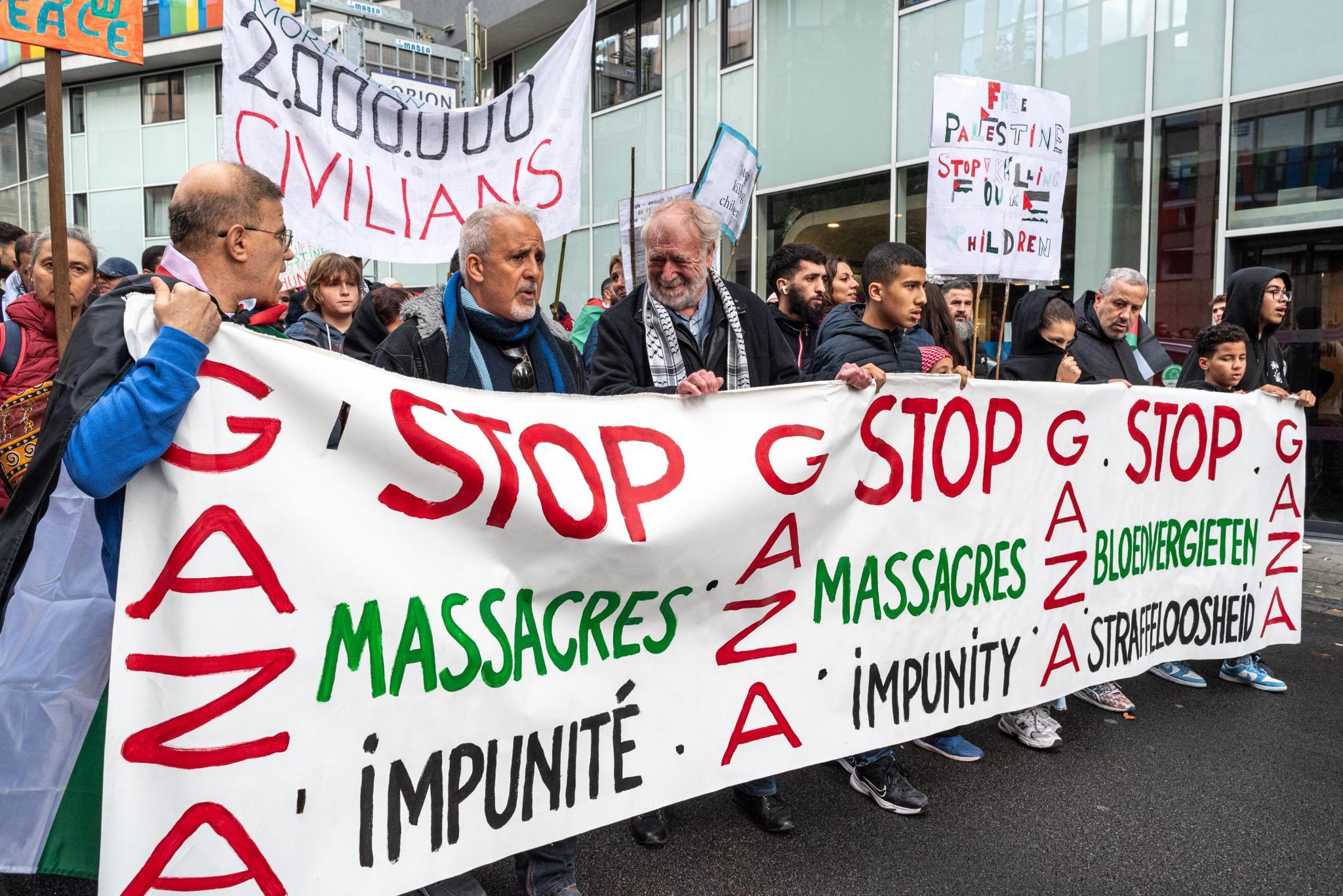Four ways to put pressure on Israel to end the war in Gaza
The Belgian government and Prime Minister Alexander De Croo have declared themselves in favour of a permanent ceasefire. This is a good thing, and shows that grassroots pressure is working. But the government can do much more to stop the massacres in Gaza. It must do more than just talk. Concrete actions must follow.
Wednesday, November 29, 2023
A temporary truce is all very well, but at best it's a plaster on a wooden leg. What we need is a real ceasefire. This will only happen if we keep up the pressure. Israeli Defense Minister Yoav Gallant has already announced that he expects at least two more months of heavy offensives if fighting resumes.
The Belgian government and our Prime Minister, Alexander De Croo, have declared themselves in favour of a permanent ceasefire. This is a good thing, and shows that the pressure exerted from below is working. This is why we continue to put forward four demands. Because the Belgian government can do much more to put an end to the bloodbath in Gaza. It must not stop at words, but put his money where his mouth is.
1. Bring Netanyahu before the International Criminal Court

"We've never seen anything like it," say experienced rescue workers. The situation is not comparable to that of other recent wars. In Ukraine, children account for 6% of victims, compared with 10% in Syria. In Gaza, 42% of victims are children. Israel has already killed more women and children in six weeks in Gaza than the United States did in Iraq in an entire year after the 2003 invasion. The number of civilians killed is comparable with the number of civilians killed by the United States and its allies in Afghanistan over 20 years.
So it's hardly surprising that calls are growing for Israeli Prime Minister Netanyahu to be brought to justice. This is possible because an International Criminal Court (ICC) was created in The Hague 20 years ago. In the meantime, 116 states have joined. It was set up to judge war crimes, genocide and crimes against humanity.
Only... like the United States, for example, Israel does not recognize the Criminal Court. Unlike Palestine. The Court therefore considers that it can judge crimes committed by Israelis on Palestinian territory. As a result, an inquiry into the crimes committed by Israel in Palestine has already been opened in 2021, despite opposition from Israel and the United States.
Last month, Karim Khan, the prosecutor of this criminal court, visited the border post between Egypt and the Gaza Strip. He declared that the current attacks would be included in the investigation. It is therefore quite possible that an arrest warrant will be issued for Prime Minister Netanyahu and other Israeli leaders. For this, two other elements are needed, and Belgium can help bring them together.
First of all, resources are needed. The International Criminal Court depends entirely on what its Member States make available in terms of money, resources, personnel, information, etc. Belgium has already pledged 5 million euros. That's a good start.
But political pressure is at least as important as the resources. The speed with which the Court deals with complaints depends to a large extent on the pressure exerted by member states to give priority to a case. There is even a formal procedure for this: Member States can "refer" a particular case to give priority to the investigation and possibly issue an arrest warrant. In early November, five countries did so: Bolivia, South Africa, Bangladesh, the Comoros and Djibouti. But that's clearly not enough. So far, the Criminal Court has been dragging its feet in taking concrete action against Benjamin Netanyahu and his government.
Compare this situation with what happened when Russia invaded Ukraine. Two days later, 39 countries had already made this "referral" to The Hague. These included Belgium and most other Western European countries. The Criminal Court prosecutor then drew up the indictment against Russian President Vladimir Putin. A year later, an arrest warrant was ready.
Netanyahu has every reason to be brought before the International Criminal Court. Several human rights organizations have already confirmed this. UN human rights experts speak of "genocide in the making". They refer to statements by several members of the Israeli government indicating a real intention to exterminate the Palestinian people and the use of extremely powerful weapons that have indiscriminately destroyed Gaza's infrastructure and caused thousands of casualties. So what is Belgium waiting for to throw its weight behind this request?
2. Suspension of the Association Agreement between the European Union and Israel

Israel takes part in European football competitions, Eurovision... You already knew that. But did you know that Europe also considers the country a privileged partner that deserves special treatment? This reality is formalized in an association agreement between Israel and the European Union that came into force in 2000, even though by then Israel had already been condemned dozens of times in UN resolutions.
The Association Agreement is a framework agreement that gives Israel certain privileges that other countries do not have, and which are specified in several other agreements. There is, for example, an agreement on a free-trade zone, so that various Israeli products and services can be sold easily and cheaply on the European market. These include high-tech products such as software, as well as medicines, fruit and vegetables, diamonds and military equipment. Moreover, Europe is Israel's main trading partner.
There is an agreement in place to ensure that pharmaceutical products approved for Israel are also immediately approved for our market. This obviously gives a huge advantage to an Israeli company like TEVA, which markets generic drugs. Unlike its Chinese and Indian competitors, it no longer has to have its medicines tested and certified before they can be sold on the European market.
There is also an "open skies" treaty, giving Israeli airlines easy access to European airspace and airports. In practice, this mainly concerns the national airline El Al, which has practically the same rights in Europe as an European airline.
The icing on the cake: Israel also has access to various European research funds. Israeli companies and research institutes are entitled to these grants in the same way as their European counterparts. This also explains why European universities are so keen to collaborate with Israeli companies and research centers.
Israel is not the only country with which Europe has concluded such an association agreement. Europe has signed a similar treaty with a number of other countries in the Mediterranean basin: Morocco, Tunisia, Algeria, Egypt and Lebanon. The European Union sees this approach as part of its "European Neighbourhood" policy.
However, the agreement with Israel is very comprehensive, granting privileges not enjoyed by other countries. There are few countries with which Europe has concluded a mutual certification agreement like the one for pharmaceutical products. And not many countries have access to European research budgets. It would therefore be logical to start by eliminating these privileges as a punitive measure.
The Association Agreement even explicitly states (article 79) that Europe can suspend the treaty if Israel does not fulfill its obligations. And according to Article 2, respect for human rights is the very principle on which all the provisions of the agreement must be based. Yet our government has yet to take any steps to suspend this European agreement.
The fact that the Association Agreement can only be suspended at European level should not prevent us from putting this request on the agenda. On the contrary: Belgium is now in an ideal position to do so, as it assumes the presidency of the European Council from January to June 2024.
In addition, the suspension of the agreement has been called for years by Palestinian and European NGOs and trade unions. Three years ago, the UN Special Rapporteur for Human Rights in Israel and Palestine already recommended that Europe suspend the agreement.
3. Implementation of a military embargo against Israel

Israel has one of the most powerful armies in the world. Last year, the country spent $23.4 billion on its weapons and army. This puts it in 15th position on the list of top arms spenders. In terms of the size of its economy, with almost 5% of its gross domestic product, it ranks even higher than the United States and just behind the Gulf States and Ukraine.
The country even has a large military industry, closely linked to the state. Local arms production is essentially in the hands of six companies, half of which are state-owned. There's even talk of a permanent war industry. Although primarily created to supply its own army, 70% of production is exported. However, the country also imports arms, or arms components, mainly from the USA and Germany.
Our country also plays a role. According to Vredesactie, Israeli airline El Al's planes shuttling between the USA and Israel make a stopover in Belgium to refuel. The cargo on these flights regularly includes military equipment. The same applies to the port of Antwerp. Ships from the Israeli shipping company ZIM, which has a military logistics contract with the Israeli government, pass through here every week. In the past, these ships have also been found to regularly carry military cargo.
Transport unions around the world have already spoken out against the transit of arms to Israel. Workers simply don't want to be complicit in war crimes. And they're absolutely right. International NGOs and human rights organizations have been advocating a military embargo against Israel for years.
No surprise there. At the time when South Africa was an apartheid state, in 1977, the United Nations even imposed an arms embargo against South Africa on all other member states. The Security Council prohibited them from "supplying South Africa with arms and related materiel of any kind, including the sale and shipment to it of arms, ammunition, vehicles, military and paramilitary equipment for use by the police, and spare parts for the aforementioned equipment."
Even if UN intervention is not yet on the agenda, Belgium can do something. Transporting weapons and munitions of war requires federal authorization. Article 6 of the UN Arms Trade Treaty stipulates that states may not authorize arms transfers if these are used to commit war crimes and attacks against civilians. Our country therefore has every reason to decline these authorizations as long as Israel is the country of destination.
When our Secretary General and Member of Parliament Peter Mertens interrogated Minister Pierre-Yves Dermagne (PS) about this in the Chamber on November 23, 2023, the Minister of the Economy gave an evasive answer. On the one hand, he confirmed that his ministry issues authorizations for the transit of ammunition in our country. After all, it's his ministry that's responsible for storing and transporting them on our territory. On the other hand, he also stated that the Regions were responsible for their final export to Israel. In short, both the Federal Government and the Regions have jurisdiction. But if the Federal Government refuses to allow ammunition to be transported to Israel, the trade is completely banned. When Russia invaded Ukraine in 2022, there was no problem and a military embargo was put in place in no time.
A second form of military embargo concerns research and development. Several of our universities are involved in research programs with Israeli partners, often thanks to European grants. The website www.stopwapenhandel.org has made a complete list. These programs must be stopped. Academics and student organizations, including Comac, are already campaigning for this at their universities. The competent ministers may also take initiatives to suspend these programs.
In addition, major Israeli arms manufacturers such as Elbit Systems and Israel Aerospace Industries (IAI) have subsidiaries, subcontractors or partners in our country. This month, a group of young people took action outside the gates of OIP, an Oudenaarde-based company belonging to the Elbit group. OIP manufactures night vision goggles for machine guns. Another example is Belgium Advanced Technology Systems (BATS), which develops electronic components for drone detection in collaboration with IAI.
The Belgian government must also examine the measures it can take to ensure that Belgian companies like OIP do not contribute to the war crimes being committed in Palestine. This applies not only to subsidiaries of Israeli companies such as OIP, but also to all Belgian companies manufacturing equipment or technologies for military use.
4. Recall the Belgian ambassador in Israel

Countries maintain diplomatic relations with each other through their embassies. These relationships are also regulated by international agreements. Basically, the fact that these channels of communication and agreements exist is a good thing, even between warring parties. How else would it be possible to negotiate a prisoner exchange or prepare for peace talks?
The severance of diplomatic relations is therefore a far-reaching measure. Only two states, Bolivia and Belize, have broken off relations with Israel. Our government shouldn't go that far. In diplomacy, there are other ways of expressing discontent. The first step is often to call back your ambassador. By doing so, a country sends out a strong signal, without immediately blowing up all the bridges. Chile, Colombia, Honduras, Bahrain, Jordan, Turkey, Chad and South Africa have recalled their ambassadors from Tel Aviv. There's no reason why our country shouldn't follow their example.
When our Prime Minister and his Spanish counterpart called for a ceasefire and respect for the laws of war under pressure from public opinion, the Israeli government summoned the Belgian and Spanish ambassadors. It's the world upside down. The Spanish Prime Minister had the audacity to summon the Israeli ambassador to Madrid, while De Croo prudently confined himself to an invitation to coffee. So, on the diplomatic stage too, our country would do well to step up a gear.